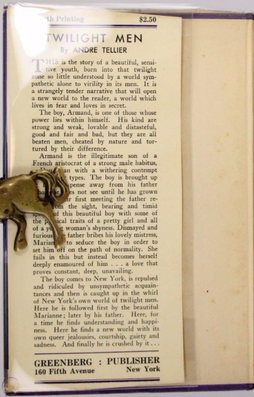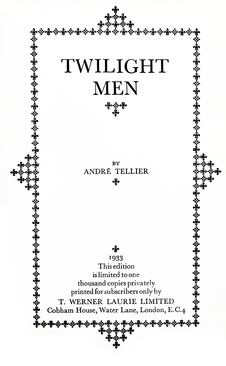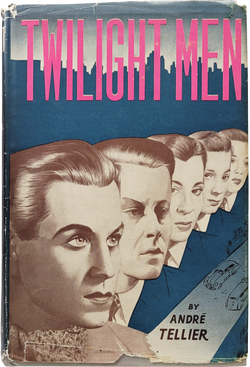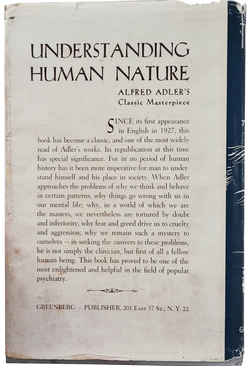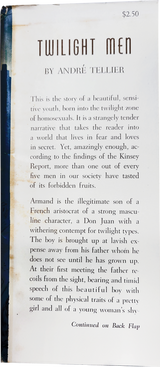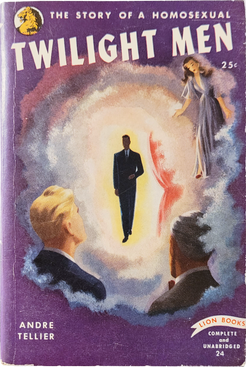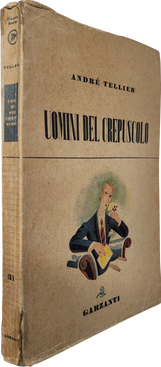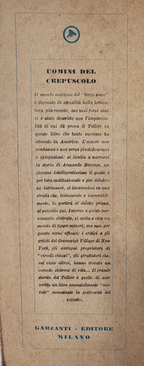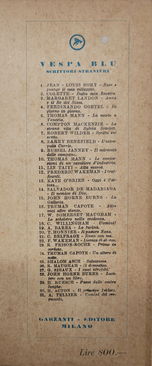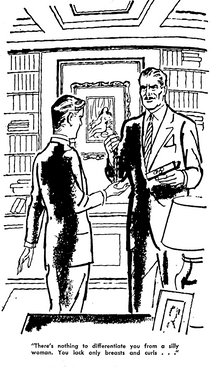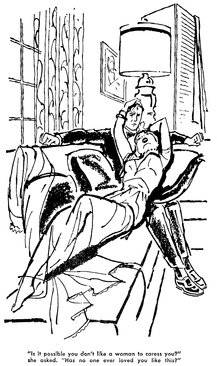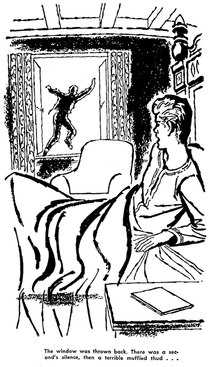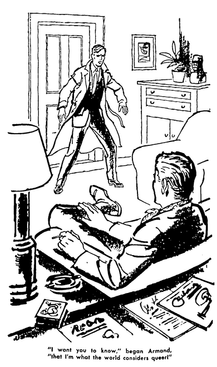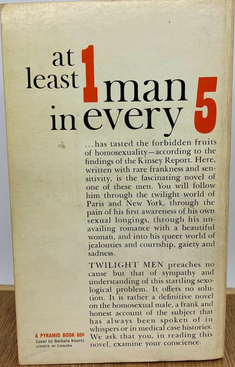Twilight Men—
André Tellier's second novel. It launched January 27th, 1931 by Greenberg, New York as a 338-page volume. It flew through at least seven prints and sold over 100,000 copies. Three later prints as a pulp helped secure the novel's reputation as a clichéd and dramatic story of the queer experience.
The first US edition (1931), first UK edition (1933), and second US edition (1948) all contain different texts.
After the deaths of his two loves, Armand moves from France to face New York city and self-discovery. A woman hired by his acrimonious father tails him, although her attempts to seduce him break way to a unreturned infatuation. After Armand drifts through the city, he finally finds community in the artistic queer scene, where he receives support as a poet and as a man who loves other men. However, the nights of drinking, drugs, and naivete drag him into ruin.

Editions
New York : Greenberg
1931. 338 pages. First Edition.
Cover by Nat Falk. Sold for $2.50, then later in a $0.75 edition.
First Printing, February, 1931
Second Printing, February, 1931
Third Printing, March, 1931
Fourth Printing, March, 1931
Fifth Printing, April, 1931
Sixth Printing, July, 1932
Seventh Printing, February, 1933
Photos #1-4 by The Cary Collection.
London : T. Werner Laurie Ltd.
1933. First UK Edition.
1,000 copies privately printed for subscribers with publisher's advertisement and order form. A censored version which alters and shortens romantic interactions.
First Printing, December 1933
Photos mine.
New York : Greenberg
1948. 251 pages. Second Edition.
Cover likely by Leon H. Leiderman. Produced under Elliott W. McDowell. Designed by Fay Travers. Sold for $2.50. A revised version with cultural updates and occasional excisions.
First Printing, August 1948
Second Printing, November 1948
Third Printing, September 1949.
Photos mine.
New York : Lion Books
1950. Pulp. 223 pages. Pulp.
Lion Books #24. Cover by Stella Lincoln. Sold for $0.25. Contains the 1948 text.
First Printing, February 1950
Photos mine.
Milan : Garzanti
1951. 255 pages. Paperback.
as "Uomini del Crepuscolo." Printed by Lombarda Printing Industry at Vilae Trodorico, 5, Milan. #31 of the Vespa Blu foreign author series. Italian translation by Vincenzo Loriga. Sold for 800 lire.
Based on the 1948 text. Character names are adjusted, like Armand to Armando, Stephen to Stefano, and Lucien to Luciano.
First Printing, 20 March 1951
Photos mine.
New York : Pyramid Books
1957. 224 pages. Pulp.
Pyramid book G262. With six illustrations. Sold for $0.35. Contains the 1948 text.
Photo #1 by Amazon.
Photos #2 by Worthpoint.
Photos #3-8 mine.
New York : Pyramid Books
1964. Pulp.
Cover by Barbara Koontz. Sold for $0.60.
Photos #1-3 by americandaydreamantiques.

Chapter Summary
BOOK ONE.
Chapter I
1931: pg. 1-19
1933: pg. 1-
1948: pg. 1-13
Comte Edmond de Rasbon meets with Josef Bironge on June 2nd, the day of his son's eighteen birthday. They discuss the deal they had made when the boy, Armand, was young: Josef would raise him under his own name until the boy came of age, then de Rasbon would claim him as his son and turn him into his business successor. However, the Comte can only disparage fate for killing his mistress and Armand's mother while leaving him with a poetic, sensitive boy who only disgusts him.
Armand enters, Josef leaves, and the two awkwardly talk. Everything about Armand upsets the Comte. His son detests finance, cares only for daydreaming and soul-searching, and responds to his insults with hurt naivete. Armand explains that he wishes to be a writer instead. Directly and indirectly, de Rasbon continues to insult Armand until he finally gives Armand a necklace of his mother. Josef returns to separate the two. Detecting de Rasbon's loathing, Armand attempts to return the necklace. De Rasbon refuses and offers to see him again the following week. The bewildered Armand leaves.
Chapter II
1931: pg. 19-27
1933: pg. 1-
1948: pg. 13-19
Back at home in Verrière, Armand and Bironge discuss the previous day. Bironge insists that de Rasbon likes Armand despite the insults. He encourages Armand to visit him again. However, Armand has not recovered from de Rasbon's insults. He pities himself, reasserts his philosophy of art, and calls Bironge peculiar; the same insult hurts his Uncle. Armand retreats to the music room to play Chopin and ruminate on the world's constant laughing at him. At the window, the only person who accepts him waves from behind the glass and smiles: Henri the gardener.
Later, Armand writes poetry in a mad fever. Bironge enters the room and inquires about it, but Armand exclaims that he can't produce anything. To deliberately incense Armand, Bironge challenges Armand's lofty claims of his poetry's merit, then tells him that he will never be a man because he shows no interest in women yet is so womanly. Armand declares that he has no interest in sex—only love. Bironge drops the argument and asks to see Armand's poetry, but Armand destroys the papers. Bironge leaves for a walk in the rain, then returns to a sleeping Armand. He frets about the boy's future.
Chapter III
1931: pg. 27-36
1933: pg. 1-
1948: pg. 19-26
Marianne Dodon waits impatiently in de Rasbon's drawing room. Despite being thirty-five, she admires her beauty in the mirror until de Rasbon arrives. They flirt and discuss de Rasbon's imminent departure until a message arrives. Armand is on the way. De Rasbon turns to his mistress and promises her a diamond necklace if she can seduce his son and disrupt his strange path. She agrees.
Soon after Armand's entrance, de Rasbon makes an excuse to leave him alone with Marianne. Her pestering small talk eventually forces him to look at her. She catches his engagement immediately when she says that she likes him. Desperate for approval, Armand attends to her talk until she alludes to a secret he has. Armand retreats into himself, then retreats further when she leans forward as if to kiss him.
De Rasbon returns. Marianne tells him that their wager still stands—he agrees—and she departs. Once he asks if Armand likes Marianne, Armand redirects the conversation towards their own relationship. He asks how he can improve the Comte's impression of him. De Rasbon declares that Armand must marry and have a son, reigniting Armand's feelings of being ridiculed. Armand insists that he will never marry; love means something else to him.
Armand then talks of Marianne, and asks his father if he thinks it was a fluke that she tried to kiss him. De Rasbon advises Armand that Marianne is a deliberate, knowledgeable woman. Understanding, Armand says that he will show her at tea time what type of man he is—meaning one who is disinterested in her advances. Returning to disgust, de Rasbon insults Armand again and leaves without responding to Armand's request to meet again in the future.
Chapter IV
1931: pg. 36-
1933: pg. 1-
1948: pg. 26-
...




%20Publishers%20Wekkly.png)
%20Publishers%20Wekkly.png)


